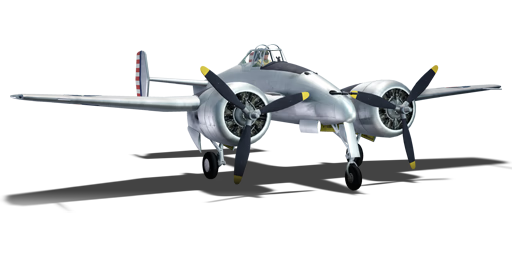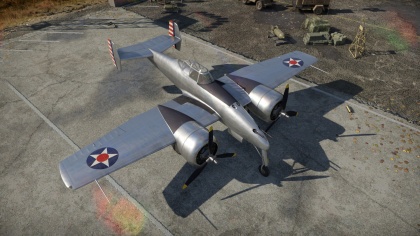Difference between revisions of "XP-50"
(Restored page from version archived 12-01-19) (Tag: Visual edit) |
(→Pros and cons) (Tag: Visual edit) |
||
| Line 130: | Line 130: | ||
=== Survivability and armour === | === Survivability and armour === | ||
<!-- Examine the survivability of the aircraft. Note how vulnerable the structure is and how secure the pilot is, whether the fuel tanks are armoured, etc. Describe the armour, if there is any, and also mention the vulnerability of other critical aircraft systems. --> | <!-- Examine the survivability of the aircraft. Note how vulnerable the structure is and how secure the pilot is, whether the fuel tanks are armoured, etc. Describe the armour, if there is any, and also mention the vulnerability of other critical aircraft systems. --> | ||
| + | |||
* 9.5 mm steel - bulkhead in front of cockpit | * 9.5 mm steel - bulkhead in front of cockpit | ||
* 9.5 mm steel - behind pilot | * 9.5 mm steel - behind pilot | ||
| Line 211: | Line 212: | ||
* Excellent climb rate. | * Excellent climb rate. | ||
* Great acceleration. | * Great acceleration. | ||
| − | * Good | + | * Good maneuverability. |
* Powerful weaponry, thanks to the two AN/M2 cannons. | * Powerful weaponry, thanks to the two AN/M2 cannons. | ||
* Good cockpit visibility. | * Good cockpit visibility. | ||
| Line 220: | Line 221: | ||
* Only 120 cannon shells and, once gone, only two .50 MGs | * Only 120 cannon shells and, once gone, only two .50 MGs | ||
| − | * | + | * No WEP available. |
| − | * | + | * Maneuverability not as responsive during long steep dives. |
* Fragile, air frame. | * Fragile, air frame. | ||
| − | |||
== History == | == History == | ||
Revision as of 20:21, 10 May 2019
Contents
Description
The XP-50 is a premium rank American twin-engine fighter
with a battle rating of (AB), (RB), and (SB). It was introduced in Update 1.31.
General info
Flight Performance
Describe how the aircraft behaves in the air. Speed, manoeuvrability, acceleration and allowable loads - these are the most important characteristics of the vehicle.
| Characteristics | |||||||
|---|---|---|---|---|---|---|---|
| Stock | |||||||
| Max Speed (km/h at 6,700 m) |
Max altitude (meters) |
Turn time (seconds) |
Rate of climb (meters/second) |
Take-off run (meters) | |||
| AB | RB | AB | RB | AB | RB | ||
| 651 | 640 | 21.0 | 21.4 | 18.6 | 21.0 | 444 | |
| Upgraded | |||||||
| Max Speed (km/h at 6,700 m) |
Max altitude (meters) |
Turn time (seconds) |
Rate of climb (meters/second) |
Take-off run (meters) | |||
| AB | RB | AB | RB | AB | RB | ||
| 713 | 681 | 18.5 | 19.7 | 34.0 | 25.0 | 444 | |
Details
| Features | ||||
|---|---|---|---|---|
| Combat flaps | Take-off flaps | Landing flaps | Air brakes | Arrestor gear |
| ✓ | ✓ | ✓ | X | X |
| Limits | ||||
|---|---|---|---|---|
| Wing-break speed (km/h) |
Gear limit (km/h) |
Combat flap (km/h) |
Max Static G | |
| + | - | |||
| 480 | ~10 | ~6 | ||
| Optimal velocities | |||
|---|---|---|---|
| Ailerons (km/h) |
Rudder (km/h) |
Elevators (km/h) |
Radiator (km/h) |
| < 350 | < 400 | < 350 | > 300 |
| Compressor (RB/SB) | ||
|---|---|---|
| Setting 1 | ||
| Optimal altitude | 100% Engine power | WEP Engine power |
| 5,520 m | 2,200 hp | 2,398 hp |
Survivability and armour
- 9.5 mm steel - bulkhead in front of cockpit
- 9.5 mm steel - behind pilot
Armaments
Offensive armament
The XP-50 is armed with:
- 2 x 20 mm AN/M2 cannons, nose-mounted (60 rpg = 120 total)
- 2 x 12.7 mm Browning M2 machine guns, nose-mounted (500 rpg = 1,000 total)
Usage in battles
Its excellent climb rate and acceleration make this plane great for energy fighting. It won't be hard to get altitude advantage upon the majority of your opponents, which this plane can out-climb.
Use your climb rate to be the highest plane of the battle: by wepping you should be able to climb at a 25 - 30° angle quite easily. Your priority targets are the highest enemies.
If you notice you were out-climbed, don't hesitate to roll away and climb more as a dive is a risky trade with this plane. If an enemy climbs to catch you, make a 90° climb at full power and when they starts to stall, try to boom & zoom them. Use your acceleration and/or climb rate if someone gets on your six to lose them.
Manual Engine Control
| MEC elements | ||||||
|---|---|---|---|---|---|---|
| Mixer | Pitch | Radiator | Supercharger | Turbocharger | ||
| Oil | Water | Type | ||||
| Controllable | Controllable | Not controllable | Controllable | Combined | Controllable | Controllable |
Modules
As a premium vehicle, all modifications are already equipped when purchasing the XP-50.
| Tier | Flight performance | Survivability | Weaponry | |
|---|---|---|---|---|
| I | Fuselage repair | Radiator | Offensive 12 mm | |
| II | Compressor | Airframe | New 12 mm MGs | |
| III | Wings repair | Engine | Offensive 20 mm | |
| IV | Cover | New 20 mm cannons | ||
Pros and cons
Pros:
- Excellent climb rate.
- Great acceleration.
- Good maneuverability.
- Powerful weaponry, thanks to the two AN/M2 cannons.
- Good cockpit visibility.
- The engine quickly cools down if you idle the power.
- Good dive speed.
Cons:
- Only 120 cannon shells and, once gone, only two .50 MGs
- No WEP available.
- Maneuverability not as responsive during long steep dives.
- Fragile, air frame.
History
Describe the history of the creation and combat usage of the aircraft in more detail than in the introduction. If the historical reference turns out to be too big, take it to a separate article, taking a link to the article about the vehicle and adding a block "/ History" (example: https://wiki.warthunder.com/(Vehicle-name)/History) and add a link to it here using the main template. Be sure to reference text and sources by using <ref>, as well as adding them at the end of the article. This section may also include the vehicle's dev blog entry (if applicable) and the in-game encyclopedia description (under === Encyclopedia Info ===, also if applicable).
Media
Excellent additions to the article would be video guides, screenshots from the game, and photos.
See also
Links to the articles on the War Thunder Wiki that you think will be useful for the reader, for example:
- reference to the series of the aircraft;
- links to approximate analogues of other nations and research trees.
External links
Paste links to sources and external resources, such as:
- topic on the official game forum;
- encyclopedia page on the aircraft;
- other literature.
| USA twin-engine fighters | |
|---|---|
| P-38 | XP-38G · P-38E · P-38G-1 · P-38J-15 · Bong's P-38J-15 · P-38L-5-LO · P-38K · YP-38 |
| P-61 | P-61A-11 · P-61C-1 |
| F7F | F7F-1 · F7F-3 |
| Other | XF5F · XP-50 · F-82E |
| USA premium aircraft | |
|---|---|
| Fighters | Thach's F2A-1 · Galer's F3F-2 · F2G-1 · F4U-4B VMF-214 · P-26A-34 · Rasmussen's P-36A · P-40C · P-43A-1 |
| P-47M-1-RE · ⋠P-47M-1-RE · P-51A · P-51D-10 · P-51D-20-NA · ␠Kingcobra · XP-55 | |
| ▃A6M2 · ▃Ki-43-II · ▃Ki-61-Ib · ▃Bf 109 F-4 · ▃Fw 190 A-8 · ▃Spitfire LF Mk IXc | |
| Twin-engine fighters | XP-38G · Bong's P-38J-15 · P-38K · YP-38 · P-61A-11 · XF5F · XP-50 · F7F-3 |
| Jet fighters | P-59A · F-86F-35 · F-89B · F-89D · F-4S Phantom II · F-5C · F-20A |
| Strike aircraft | A-1H · A2D-1 · AU-1 · XA-38 · AV-8A · AV-8B (NA) · A-6E TRAM · A-10A |
| Bombers | A-26C-45DT · B-10B · BTD-1 · PBM-3 "Mariner" · PBM-5A "Mariner" · PV-2D |





